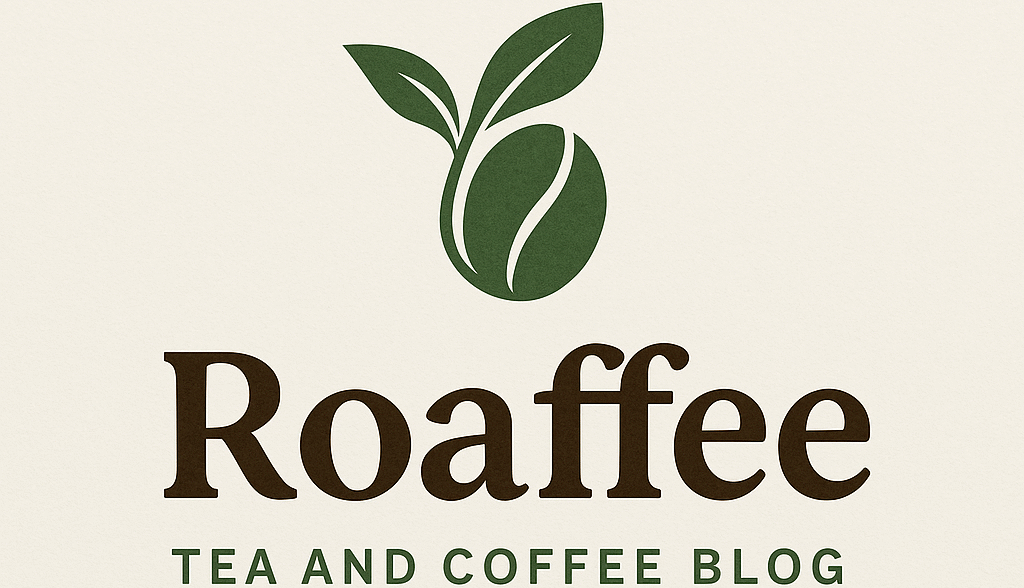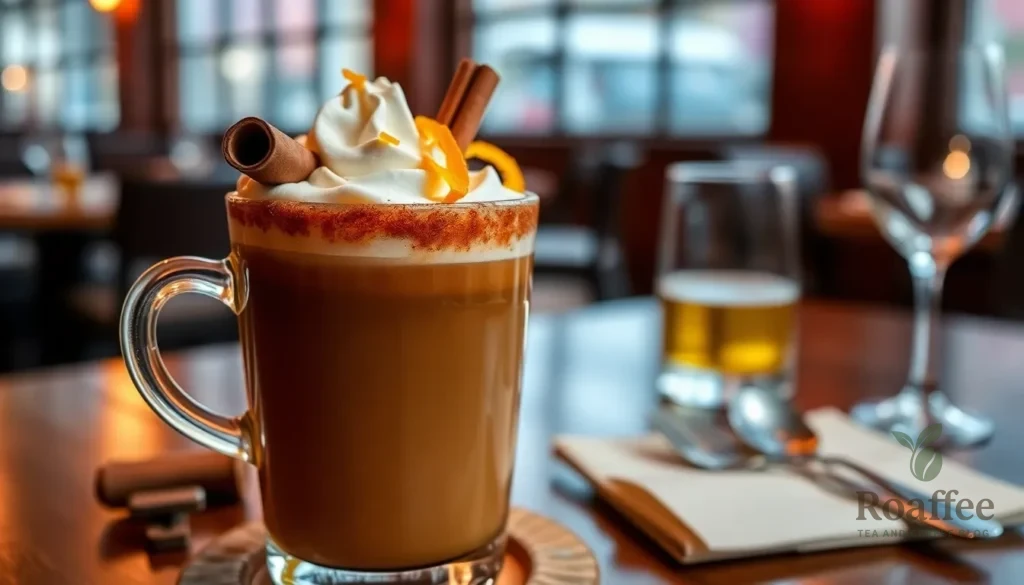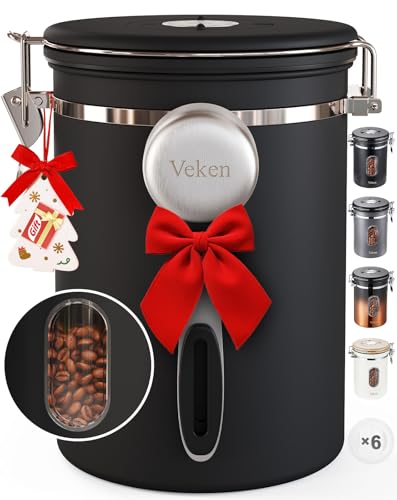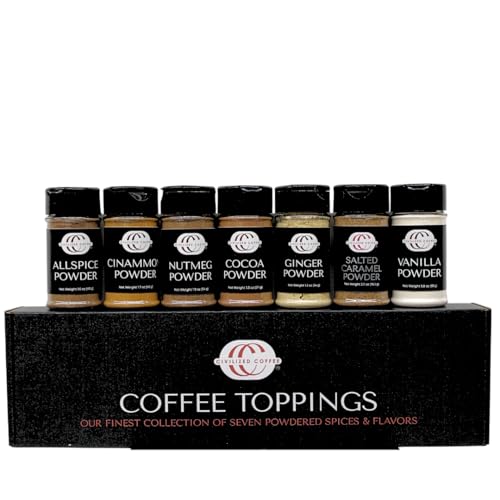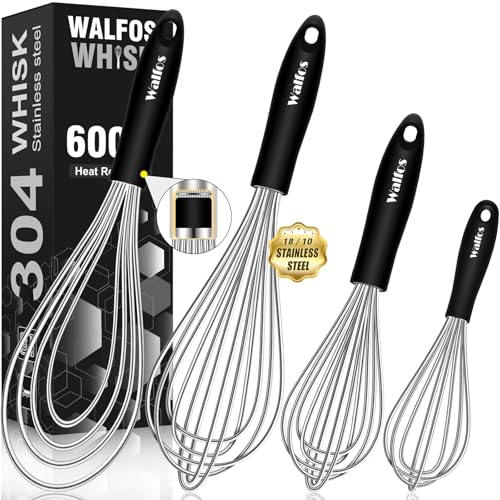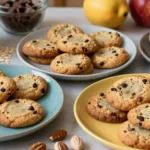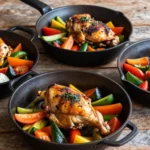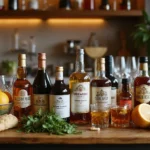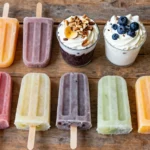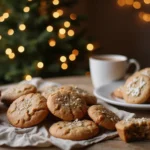We’ve discovered the perfect way to transform your ordinary coffee routine into something extraordinary with this authentic Spanish coffee recipe. This beloved beverage combines rich espresso with warm spices and a touch of Spanish flair that’ll transport you straight to a cozy café in Madrid or Barcelona.
Spanish coffee isn’t just another caffeinated drink – it’s a centuries-old tradition that reflects Spain’s deep coffee culture. The secret lies in the perfect balance of bold coffee flavors with aromatic spices like cinnamon and sometimes a hint of orange zest. What makes this recipe truly special is how it brings together simple ingredients to create something that tastes incredibly sophisticated.
Whether you’re looking to impress guests at your next dinner party or simply want to elevate your morning coffee ritual, this Spanish coffee recipe delivers every time. We’ll show you how to create this cafe-quality beverage right in your own kitchen using ingredients you likely already have on hand.
Ingredients
We’ve carefully selected these ingredients to create the perfect balance of bold espresso and warm Spanish spices that make this coffee truly special. Each component plays an essential role in delivering the authentic flavors that define traditional Spanish coffee.
For the Spanish Coffee
- 2 shots fresh espresso (or 1/2 cup strong coffee)
- 1 tablespoon brown sugar
- 1/2 teaspoon ground cinnamon
- 1/4 teaspoon vanilla extract
- 1/8 teaspoon orange zest (freshly grated)
- Pinch of ground nutmeg
- 1/4 cup whole milk (heated)
- 1 tablespoon Spanish brandy (optional)
For the Whipped Cream
- 1/2 cup heavy cream
- 1 tablespoon powdered sugar
- 1/4 teaspoon vanilla extract
- Pinch of ground cinnamon
For Garnish
- Ground cinnamon for dusting
- Orange zest strips
- Cinnamon stick (for stirring)
- Dark chocolate shavings (optional)
Equipment Needed
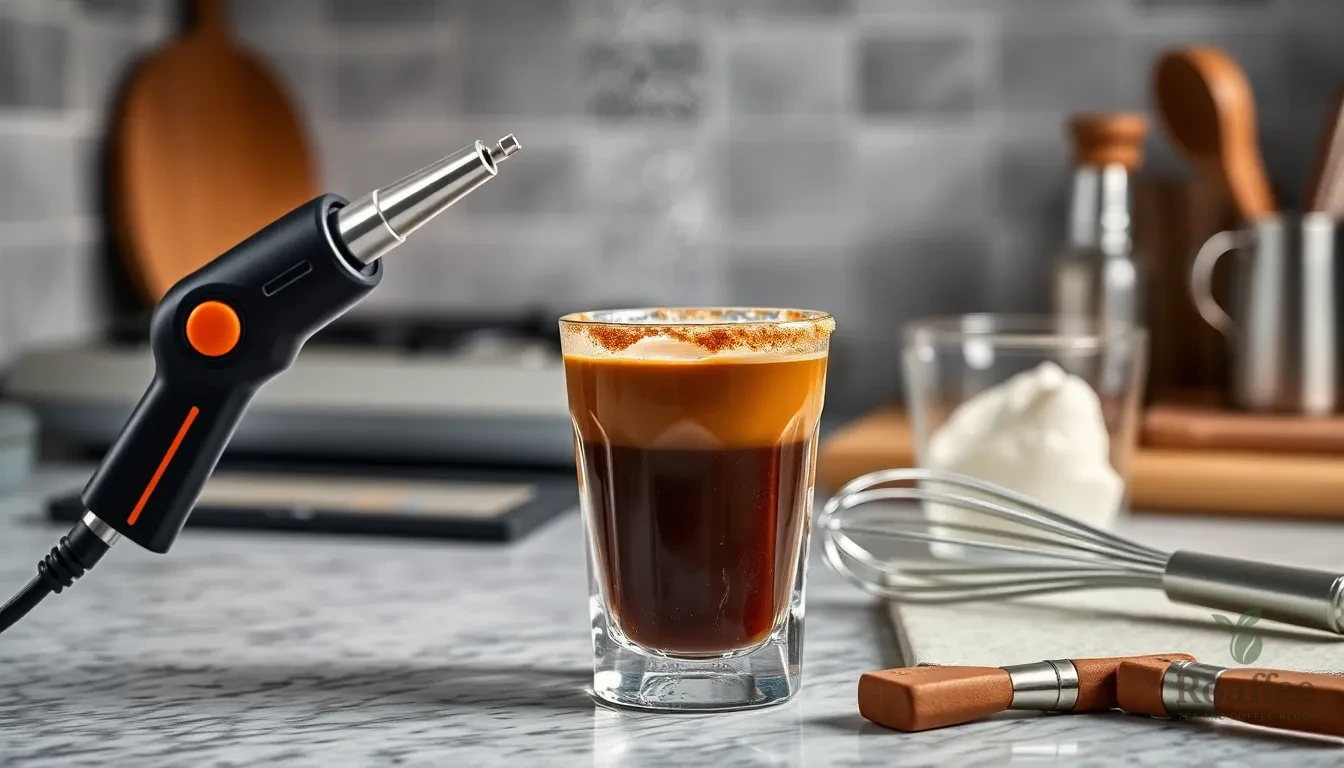
Creating an authentic Spanish coffee requires exact equipment to achieve that signature caramelized sugar rim and dramatic presentation. We recommend gathering these essential tools before starting your Spanish coffee preparation.
Heat-Resistant Glass
Our Spanish coffee demands a glass that can withstand high temperatures and open flames. We suggest using a thick-walled glass mug or specialized coffee glass designed for hot beverages. The glass must be suitable for both flaming and serving since you’ll be caramelizing sugar directly on the rim.
Kitchen Torch or Lighter
A kitchen torch provides the most control when caramelizing the sugar rim. We find this tool essential for achieving that perfect burnt sugar effect that defines Spanish coffee. A standard lighter works as an alternative though it offers less precision for the caramelization process.
Measuring Tools
Accurate measurements ensure consistent flavor balance in every cup. We use a jigger or shot glass for measuring the rum, coffee liqueur, and Grand Marnier. These tools help maintain the proper ratios that make Spanish coffee so distinctive.
Mixing Utensils
A long spoon or stirrer becomes crucial for gently combining the liqueurs and coffee without disturbing the caramelized rim. We recommend using a heat-resistant spoon that won’t conduct heat from the warm ingredients.
Whisk or Mixer
Creating that signature cream topping requires proper whipping equipment. We suggest using a small whisk for manual control or an electric mixer for consistent results. The cream should reach a soft peak consistency that floats beautifully on top of your Spanish coffee.
| Equipment | Purpose | Alternative Options |
|---|---|---|
| Heat-resistant glass | Serving and flaming | Thick coffee mug |
| Kitchen torch | Caramelizing sugar rim | Standard lighter |
| Measuring jigger | Accurate liquid measurements | Shot glass |
| Long spoon | Stirring ingredients | Heat-resistant stirrer |
| Whisk | Whipping cream | Electric mixer |
Having these tools ready ensures smooth preparation and helps you achieve the authentic Spanish coffee experience that combines visual drama with exceptional taste.
Instructions
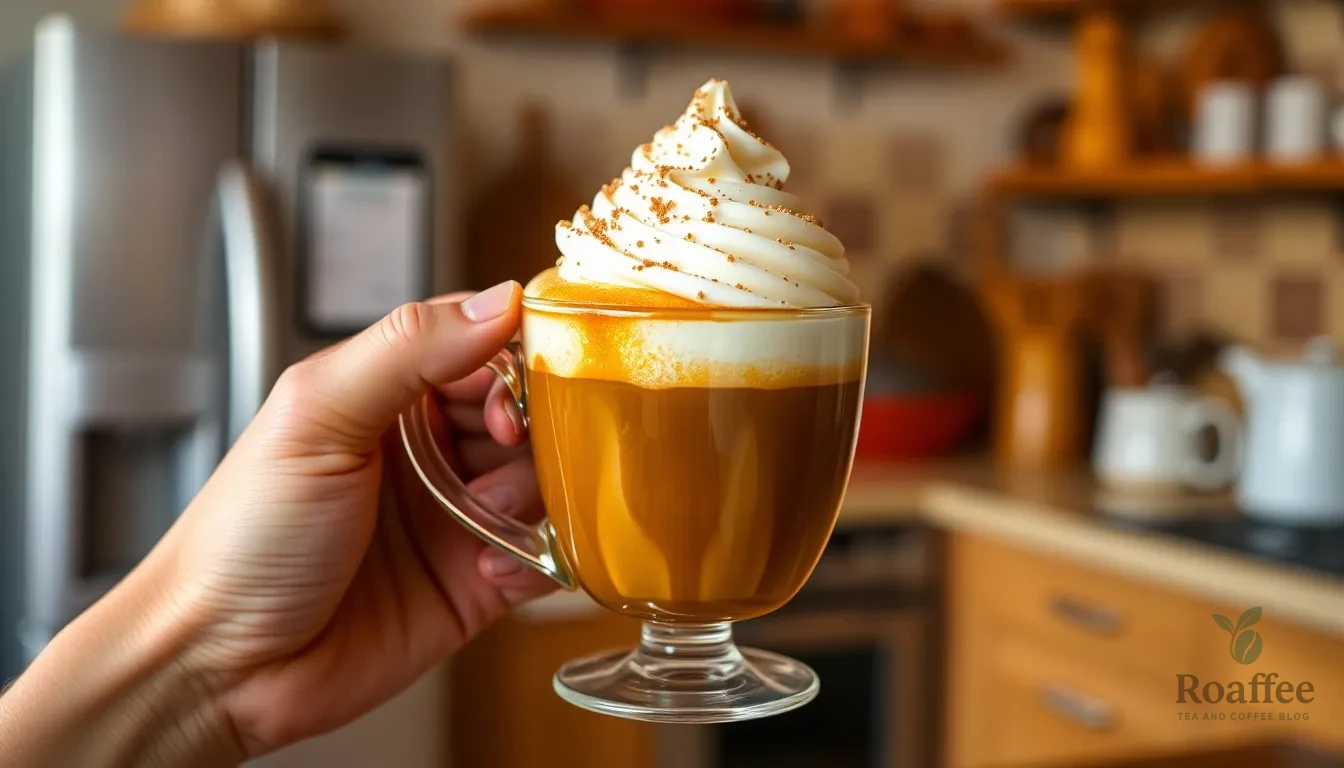
Creating an authentic Spanish coffee requires careful attention to timing and technique. We’ll guide you through each step to achieve that perfect balance of flavors and the dramatic presentation that makes this drink so special.
Prep the Glass
We begin by preparing our heat-resistant glass for the signature caramelized sugar rim. Take a stemmed wine glass or Irish coffee glass and moisten the rim with a lemon or orange wedge. Roll the dampened rim in superfine sugar until it coats evenly all around. This sugar foundation will create the stunning caramelized effect when we ignite the alcohol later.
Prepare the Coffee Base
Brew a strong cup of espresso or coffee while preparing the other components. We need ¾ cup of hot freshly brewed coffee that’s bold enough to stand up to the other flavors. Keep the coffee hot as we’ll be adding it after the flambé process. Have your brown sugar ready for dissolving into the warm mixture.
Create the Flambé
Pour ½ oz of dark rum and ½ oz of triple sec into the prepared glass. Using a long lighter or match carefully ignite the alcohol mixture. Hold the glass at an angle and slowly rotate it to allow the flames to caramelize the sugar rim. This process creates the distinctive burnt sugar flavor and provides the dramatic visual element that makes Spanish coffee so impressive.
Add the Coffee
Once the flames naturally die down add ½ oz of coffee liqueur to the glass. Pour the hot coffee slowly to maintain the temperature and prevent the glass from cracking. Stir in 1 teaspoon of brown sugar until it completely dissolves. The combination should create a rich aromatic base with balanced sweetness.
Top with Whipped Cream
Generously top the coffee with freshly whipped cream creating a beautiful contrast against the dark liquid. Garnish with a light sprinkle of ground nutmeg or cinnamon for extra aroma and visual appeal. The cream should float on top creating distinct layers that showcase the drink’s complexity.
| Step | Time Required | Key Temperature |
|---|---|---|
| Glass Preparation | 2 minutes | Room temperature |
| Coffee Brewing | 3-4 minutes | 195-205°F |
| Flambé Process | 1-2 minutes | Ignition point |
| Final Assembly | 2 minutes | Hot serving temperature |
| Total Time | 8-10 minutes | Serve immediately |
Directions for Perfect Spanish Coffee
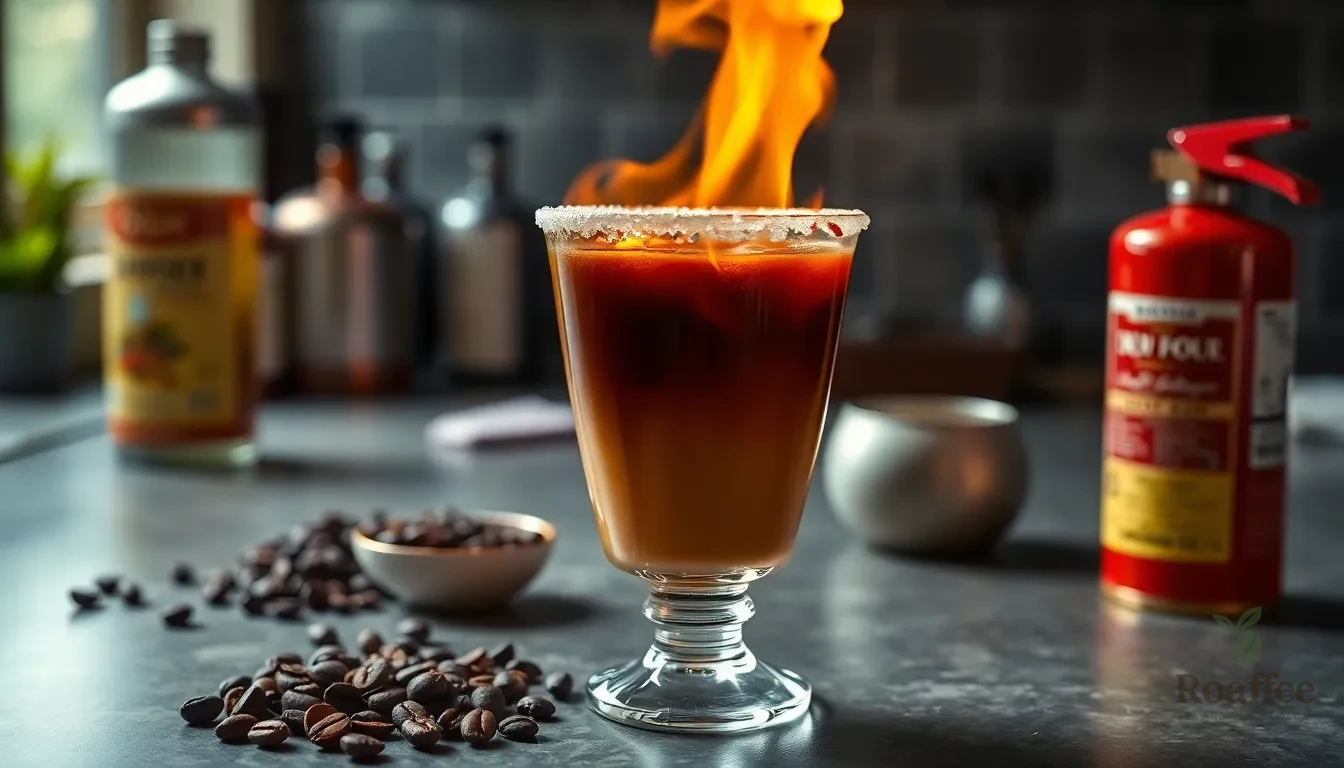
Now that we have our ingredients and equipment ready, let’s master the art of creating this spectacular flaming coffee drink. The key to success lies in precise timing and careful attention to safety protocols.
Timing Tips
We recommend preparing and serving this drink within minutes to capture the optimal flavors and ensure the flame effect creates maximum visual impact. The caramelizing process should happen right before serving to maintain the crisp burnt sugar texture on the rim.
Hot coffee is essential for maintaining the drink’s warmth throughout the flambéing presentation. We suggest brewing your espresso just before beginning the flaming process to ensure temperature consistency.
| Step | Time Required | Critical Notes |
|---|---|---|
| Glass preparation | 1 minute | Sugar rim must be fresh |
| Flambéing process | 2-3 minutes | Work quickly for best results |
| Coffee addition | 30 seconds | Pour while mixture is still warm |
| Cream topping | 1 minute | Add immediately after coffee |
| Total preparation | 5-6 minutes | Serve within minutes of completion |
Safety Precautions for Flambéing
We cannot emphasize enough the importance of using a heat-resistant glass designed to withstand thermal shocks. Regular glassware may crack or shatter when exposed to the high temperatures involved in flambéing.
Clear your work area of any flammable materials before lighting the rum. We recommend keeping items like paper towels, cloth napkins, and alcohol bottles at a safe distance from your workspace.
Use a long match or barbecue lighter to ignite the rum safely while maintaining distance from the flame. Never use short matches or standard lighters that require close proximity to the alcohol.
Keep a fire extinguisher or damp cloth nearby as a precautionary measure. We also suggest having a lid available to smother the flames if needed.
Avoid wearing loose clothing or having long hair near the flame during the flambéing process. Gentle swirling is sufficient for the caramelization effect without creating dangerous flame movement.
Never leave the flaming drink unattended, even for a few seconds. The flame should be monitored continuously until it naturally extinguishes or is safely smothered.
Make-Ahead Instructions
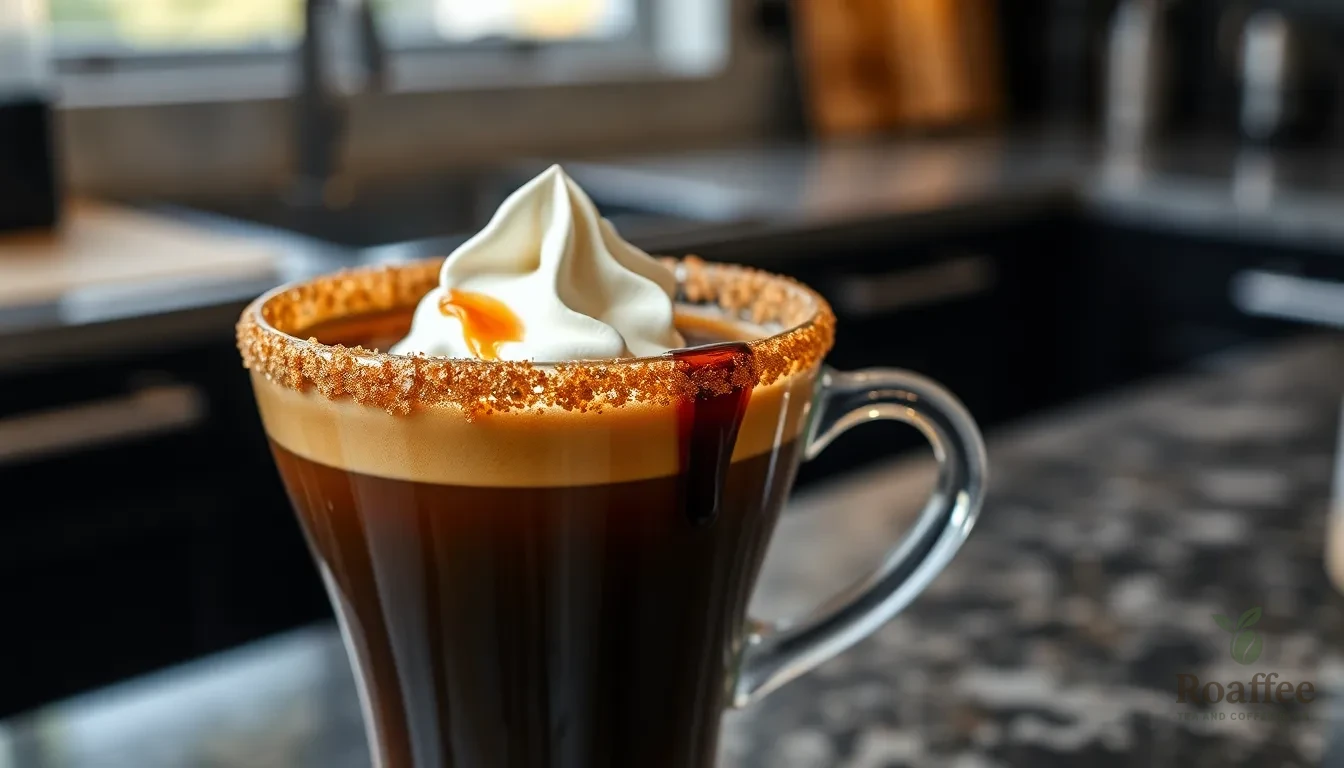
Spanish coffee delivers the best experience when prepared fresh, but we understand that planning ahead can make entertaining much smoother. The caramelized sugar rim and warm coffee base perform optimally when crafted just before serving, yet several components can be prepared in advance to streamline your preparation process.
Coffee Preparation
We recommend brewing your strong espresso or coffee base and keeping it hot in a thermal carafe or insulated pot. Fresh coffee maintains its bold flavor for up to 2 hours when stored properly at serving temperature. Avoid reheating coffee as this can create bitter notes that interfere with the delicate balance of flavors in your Spanish coffee.
Liqueur Mixture
The rum, Kahlua, and Grand Marnier blend can be mixed up to 4 hours ahead and stored in the refrigerator. We suggest combining these liqueurs in a sealed container and allowing them to chill, which actually enhances the flavors as they meld together. Remove the mixture from refrigeration 15 minutes before serving to bring it closer to room temperature.
Cream Component
Whip your heavy cream to soft peaks no more than 2 hours before serving for optimal texture and stability. Store the whipped cream covered in the refrigerator until needed. Fresh cream maintains its light, airy consistency better than cream whipped too far in advance.
Sugar Rim Preparation
The signature caramelized sugar rim requires last-minute attention for both safety and flavor reasons. We recommend preparing your heat-resistant glasses by rimming them with sugar up to 1 hour ahead, but save the caramelization process for just before serving. This timing ensures the burnt sugar maintains its crisp texture and doesn’t become sticky or lose its dramatic visual appeal.
Final Assembly Timeline
Plan for 5 minutes of active preparation time when your guests arrive. Having all components ready allows you to focus on the caramelization technique and flambéing process without rushing. This approach guarantees your Spanish coffee maintains its authentic flavor profile and stunning presentation while reducing stress during service.
Serving Suggestions
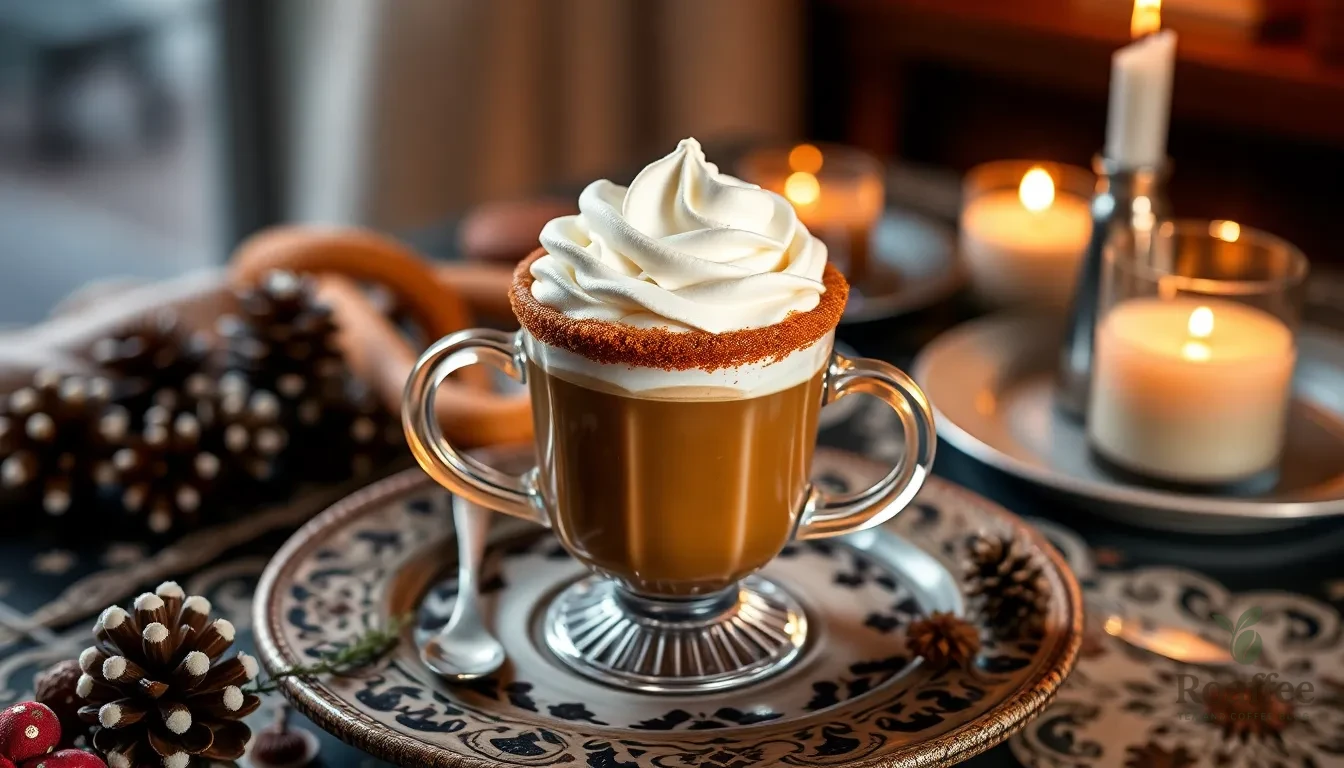
We recommend serving Spanish coffee immediately while the drink maintains its optimal temperature and the caramelized sugar rim retains its crisp texture. The dramatic presentation reaches its peak when guests witness the warm, aromatic coffee topped with fluffy whipped cream and the theatrical caramelized rim still glistening.
Light desserts pair beautifully with this rich coffee cocktail. We suggest serving alongside churros, flan, or almond cookies that complement the drink’s complex flavor profile without overwhelming the palate. The coffee’s bold rum and coffee liqueur blend creates an ideal after-dinner treat that transitions seamlessly from the main course to dessert.
Cold weather occasions showcase Spanish coffee at its finest. We find this warming cocktail particularly impressive during winter gatherings, holiday parties, or cozy evening entertaining. The flaming process adds theatrical flair that captivates guests and creates memorable moments around the table.
Timing and Temperature Guidelines:
| Serving Element | Optimal Timing | Temperature |
|---|---|---|
| Coffee base | Serve immediately | 150-160°F |
| Whipped cream | Add just before serving | Room temperature |
| Caramelized rim | Prepare 1-2 minutes prior | Still warm |
| Total assembly | 5 minutes active time | Serve hot |
Special occasions benefit from the drink’s elegant presentation. We recommend Spanish coffee for dinner parties, romantic evenings, or celebrations where the dramatic flambé technique becomes part of the entertainment. The combination of visual appeal and complex flavors makes this cocktail a conversation starter.
Accompaniment beverages work well when hosting larger groups. We suggest offering water or light appetizers alongside Spanish coffee to cleanse the palate between sips. The drink’s richness means guests typically savor one serving slowly, making it perfect for intimate gatherings rather than casual consumption.
Safety considerations remain paramount when serving. We always ensure adequate ventilation when performing the flambé technique and keep fire safety equipment nearby. The theatrical presentation should never compromise guest safety or comfort during the serving process.
Storage Tips
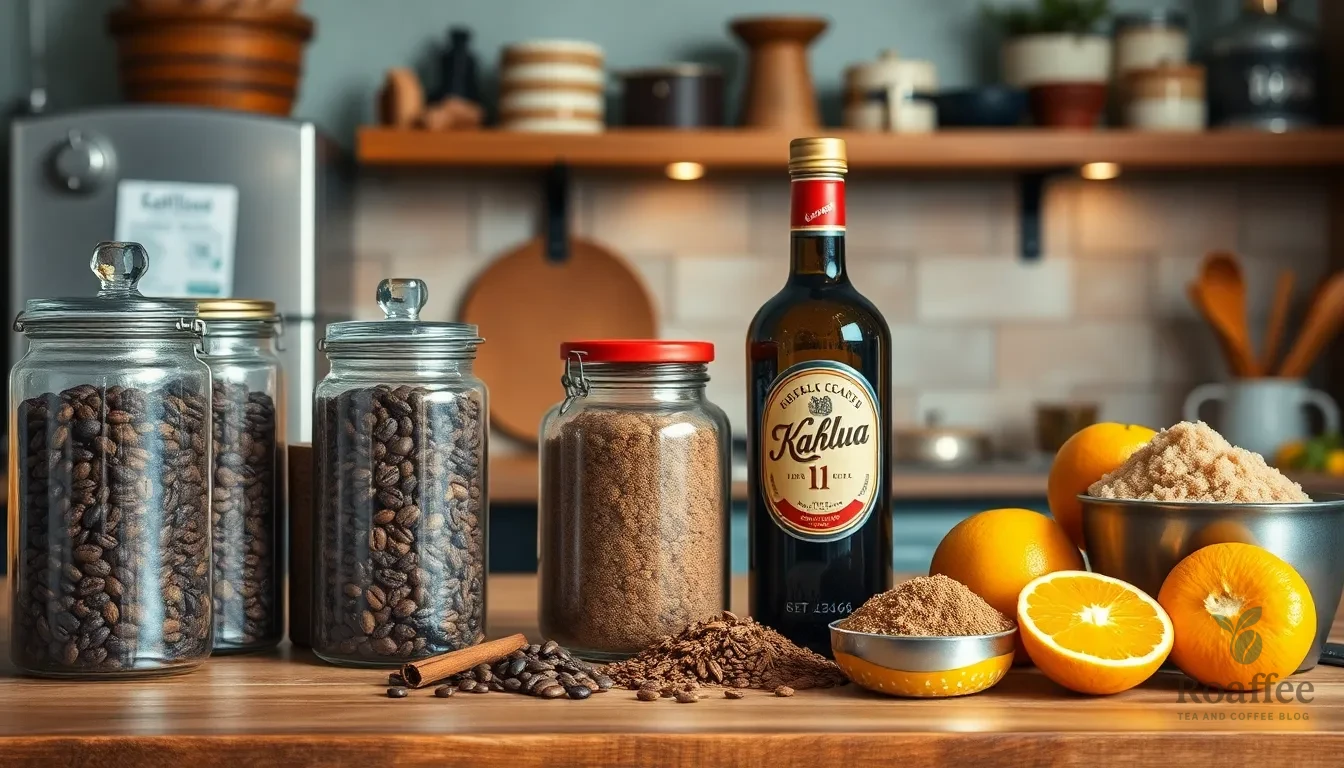
Proper storage of your Spanish coffee ingredients ensures optimal flavor and extends shelf life for future brewing sessions. We recommend storing coffee beans in airtight containers placed in cool dark locations away from direct sunlight and heat sources. This method maintains freshness for approximately two to four weeks depending on the roast level and environmental conditions.
| Storage Method | Duration | Best Practices |
|---|---|---|
| Whole coffee beans | 2-4 weeks | Airtight container in cool dark place |
| Ground coffee | 1-2 weeks | Sealed container away from moisture |
| Opened liqueurs | 6-12 months | Tightly sealed in original bottles |
| Spices (cinnamon, nutmeg) | 6-12 months | Airtight containers away from light |
Coffee beans lose their aromatic oils when exposed to air and light. We suggest purchasing whole beans and grinding them just before brewing to preserve the bold flavors essential for authentic Spanish coffee. Store opened bottles of Kahlua, Grand Marnier, and Spanish brandy in their original containers with tight seals to prevent oxidation.
Spices like cinnamon and nutmeg maintain their potency longer when stored in small airtight containers away from the stove and other heat sources. We recommend labeling containers with purchase dates to track freshness and replace spices that have lost their aromatic intensity.
Orange zest should be prepared fresh for each serving rather than stored. But, you can store whole oranges in the refrigerator for up to two weeks. Heavy cream stays fresh in the refrigerator for five to seven days past its sell-by date when properly stored.
Brown sugar requires airtight storage to prevent clumping and hardening. We suggest adding a slice of bread or marshmallow to the container if the sugar becomes hard. This moisture source helps restore the sugar’s texture for creating the signature caramelized rim.
Variations
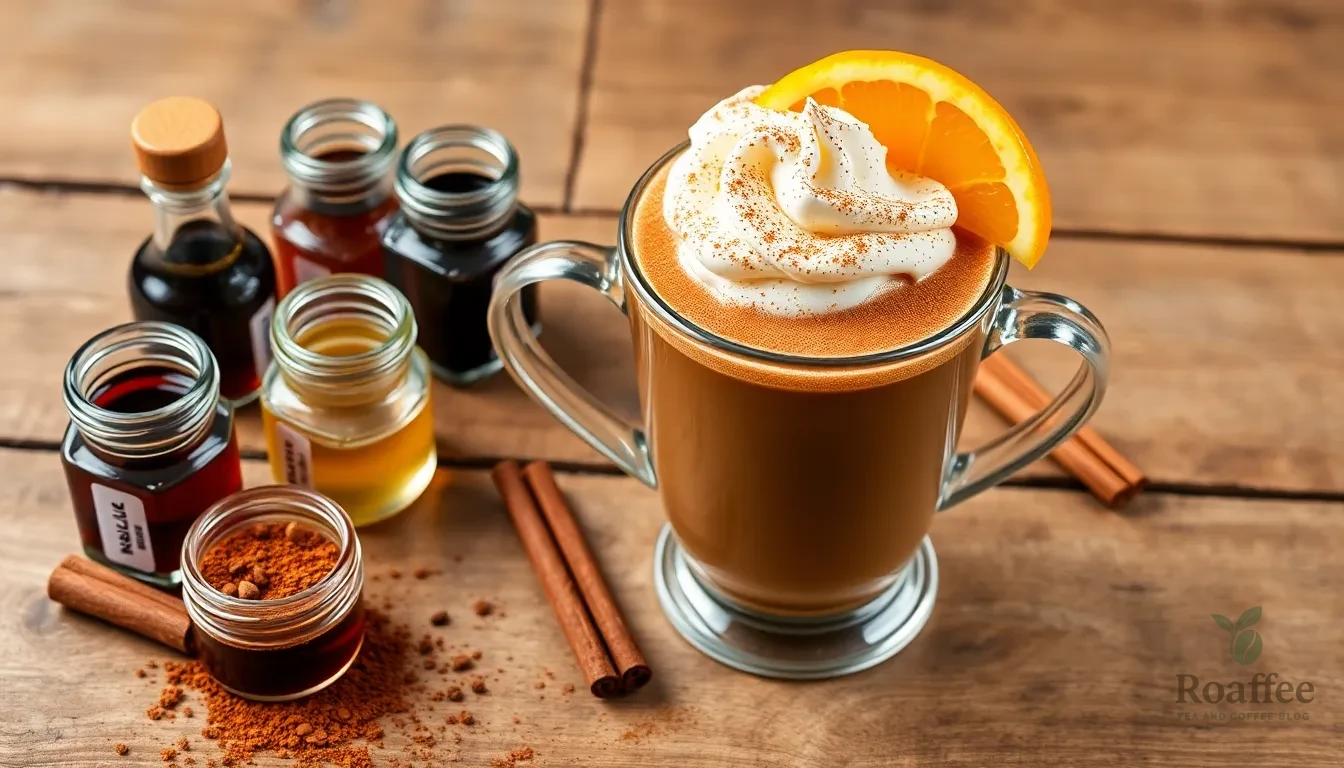
We love how versatile Spanish coffee can be to suit different preferences and occasions. These adaptations maintain the drink’s signature warmth and sophistication while accommodating various dietary needs and flavor profiles.
Non-Alcoholic Spanish Coffee
We create this alcohol-free version by omitting the rum and coffee liqueur entirely. Replace these spirits with flavored syrups such as orange or caramel to maintain the drink’s complex flavor profile. Use strong brewed espresso as the base and add 1-2 tablespoons of your chosen syrup depending on desired sweetness.
The caramelized sugar rim remains essential for authentic presentation. We recommend using orange syrup to mimic the citrus notes traditionally provided by the rum. Top with freshly whipped cream and dust with ground cinnamon or nutmeg for the complete experience.
This version delivers the same visual impact and warming comfort as the original while being suitable for all ages and those avoiding alcohol.
Flavored Spanish Coffee Options
We enhance the traditional recipe with various flavor combinations to create unique experiences. Add flavored syrups like vanilla, hazelnut, or cinnamon directly to the coffee for extra depth. Use 1-2 tablespoons per serving depending on the syrup’s intensity.
Different coffee liqueurs transform the drink’s character completely. We substitute Kahlua with orange-flavored liqueurs like Grand Marnier for a more citrus-forward profile. Amaretto adds nutty sweetness while Irish cream provides vanilla undertones.
Spice variations elevate the whipped cream topping significantly. We incorporate ground cinnamon, freshly grated nutmeg, or even a pinch of cardamom into the cream before whipping. These additions create aromatic layers that complement the coffee’s boldness.
| Flavor Profile | Syrup Addition | Liqueur Substitute | Spice Enhancement |
|---|---|---|---|
| Vanilla Warmth | 1-2 tbsp vanilla syrup | Vanilla vodka | Vanilla bean powder |
| Hazelnut Richness | 1-2 tbsp hazelnut syrup | Frangelico | Toasted hazelnut dust |
| Orange Citrus | 1-2 tbsp orange syrup | Grand Marnier | Fresh orange zest |
| Cinnamon Spice | 1-2 tbsp cinnamon syrup | Fireball whiskey | Ground cinnamon |
We also experiment with different coffee bases such as cold brew for iced versions or espresso Romano with lemon zest for Mediterranean flair. Each variation maintains the drink’s theatrical presentation while offering distinct flavor experiences.
Troubleshooting Common Issues
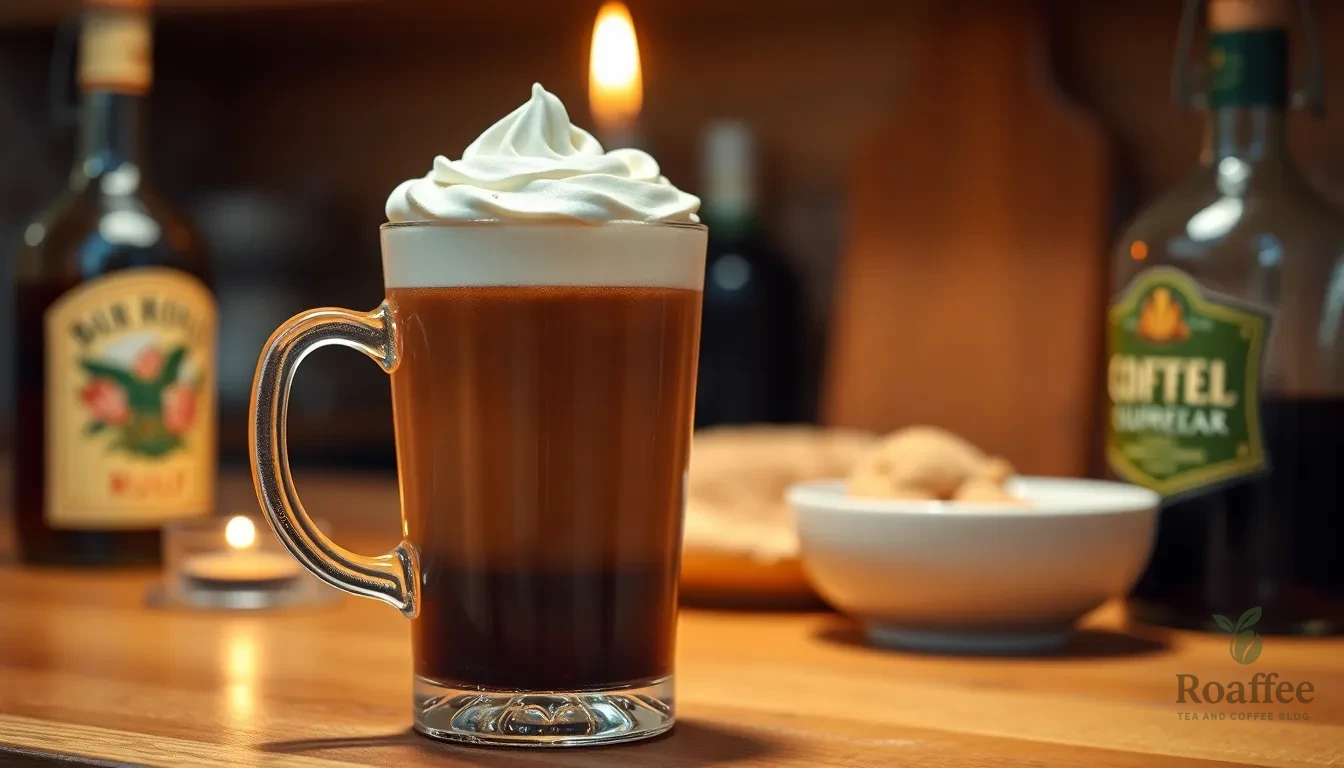
Even experienced home baristas encounter challenges when crafting the perfect Spanish coffee. We’ve identified the most common problems and their answers to help you master this spectacular drink.
Flame Won’t Ignite During Flambé
The most frequent issue occurs when the alcohol refuses to light. We recommend using 151-proof rum for reliable ignition since lower proof spirits contain too much water. Warm the glass slightly before adding liqueurs to help alcohol vapors ignite more easily. Keep flammable materials away from your workspace and ensure the glass rim has enough sugar coating to caramelize properly.
Sugar Rim Doesn’t Caramelize
When the sugar rim fails to develop that signature burnt caramel flavor, the flame duration is typically too brief. We suggest swirling the glass gently while the flame burns to distribute heat evenly across the sugar coating. The sugar should bubble and darken to achieve the proper caramelized texture. If your flame extinguishes too quickly, add a small amount of additional high-proof rum to reignite.
Whipped Cream Sinks Into Coffee
Temperature differences cause whipped cream to collapse and sink rather than float beautifully on top. We always ensure our coffee is hot but not boiling when adding the cream layer. Whip cream to soft peaks only since over-whipped cream becomes too dense and loses its light texture. Pour the cream slowly over the back of a spoon to create a proper floating layer.
Coffee Tastes Too Strong or Bitter
Balancing the bold coffee flavor with other ingredients requires precise measurements. We recommend using a coffee-to-water ratio of 1:15 for optimal strength without overwhelming bitterness. If your coffee still tastes too intense, add an extra splash of coffee liqueur or a pinch of brown sugar to the mixture. Freshly ground beans produce the best results, but avoid over-extracting by limiting brew time to 4-5 minutes.
Glass Cracks During Flambé Process
Heat shock causes ordinary glassware to crack or shatter during the flaming process. We always use heat-resistant Irish coffee glasses or thick-walled mugs designed for hot beverages. Warm the glass gradually by rinsing with hot water before adding ingredients. Never use thin wine glasses or delicate stemware for this dramatic presentation.
Liqueur Blend Tastes Unbalanced
The harmony between rum, coffee liqueur, and orange liqueur creates Spanish coffee’s distinctive flavor profile. We maintain a 2:1:1 ratio of coffee to coffee liqueur to orange liqueur for optimal balance. If the drink tastes too sweet, reduce the coffee liqueur slightly. For more citrus brightness, add a few drops of fresh orange juice to complement the orange liqueur.
Foam Disappears Too Quickly
Proper foam retention requires attention to coffee temperature and cream consistency. We serve Spanish coffee immediately after preparation to maintain the whipped cream’s structure. Cold cream whips better than room temperature cream, so keep your heavy cream chilled until ready to use. Add a small amount of powdered sugar to stabilize the whipped cream if serving multiple drinks.
Conclusion
Now you’ve got everything you need to master this show-stopping Spanish coffee recipe. We’ve covered the essential techniques from creating that perfect caramelized sugar rim to executing the dramatic flambé safely.
This isn’t just another coffee drink – it’s an experience that’ll transform your entertaining game. Whether you’re hosting a dinner party or simply treating yourself to something special the combination of bold espresso warm spices and theatrical presentation never fails to impress.
Remember that practice makes perfect especially with the flambé technique. Don’t be discouraged if your first attempt isn’t flawless – even experienced baristas needed time to master this art.
With proper ingredient storage and our troubleshooting tips you’ll be crafting café-quality Spanish coffee at home with confidence. Your guests will be asking for the recipe and you’ll have a signature drink that sets you apart from the typical coffee offerings.
Frequently Asked Questions
What is Spanish coffee and how is it different from regular coffee?
Spanish coffee is an authentic Spanish beverage that combines bold espresso with warm spices like cinnamon and orange zest. Unlike regular coffee, it features a dramatic flambé presentation, caramelized sugar rim, and whipped cream topping. The drink often includes Spanish brandy or rum, creating a sophisticated café-quality experience that reflects Spain’s rich coffee culture.
What ingredients do I need to make authentic Spanish coffee?
Essential ingredients include fresh espresso, brown sugar, ground cinnamon, vanilla extract, orange zest, nutmeg, whole milk, and optional Spanish brandy. You’ll also need heavy cream for whipped topping and garnishes like cinnamon sticks, orange zest strips, or dark chocolate shavings. High-proof rum is recommended for the flambé process.
Is it safe to flambé Spanish coffee at home?
Yes, flambéing Spanish coffee is safe when proper precautions are followed. Use high-proof rum, ensure adequate ventilation, keep a lid nearby to extinguish flames if needed, and maintain a safe distance from flammable materials. Always prepare the drink away from guests and follow precise timing for optimal safety and presentation.
Can I make Spanish coffee without alcohol?
Absolutely! Create a non-alcoholic version by replacing rum and coffee liqueur with flavored syrups like vanilla, hazelnut, or cinnamon. This maintains the drink’s complex flavor profile while making it suitable for all ages. You can still achieve the caramelized sugar rim and whipped cream presentation without compromising taste.
How long can I store Spanish coffee ingredients?
Whole coffee beans last 2-4 weeks in airtight containers, while ground coffee stays fresh for 1-2 weeks. Opened liqueurs maintain quality for 6-12 months when tightly sealed. Spices like cinnamon and nutmeg keep for 6-12 months in airtight containers away from light. Heavy cream lasts 5-7 days refrigerated, and brown sugar needs airtight storage to prevent clumping.
What’s the best way to serve Spanish coffee for entertaining?
Spanish coffee should be served immediately while hot to maintain the crisp caramelized sugar rim texture. Prepare components ahead: brew espresso and keep hot, mix liqueur blend in advance, and whip cream just before serving. Allow 5 minutes for final assembly when guests arrive for optimal presentation and flavor impact.
What desserts pair well with Spanish coffee?
Spanish coffee pairs excellently with light desserts like churros, flan, or almond cookies. The drink’s bold flavors complement sweet treats without overwhelming them. It’s particularly impressive as an after-dinner beverage during cold weather occasions, winter gatherings, or holiday parties where the flambé adds theatrical flair to the dining experience.
Why won’t my Spanish coffee flambé properly ignite?
Flambé issues typically stem from using low-proof alcohol or incorrect temperature. Use high-proof rum (at least 40% alcohol), ensure the rum is at room temperature, and warm the glass slightly before adding alcohol. Remove from heat source before igniting, and tilt the glass slightly away from you when lighting for best results.
